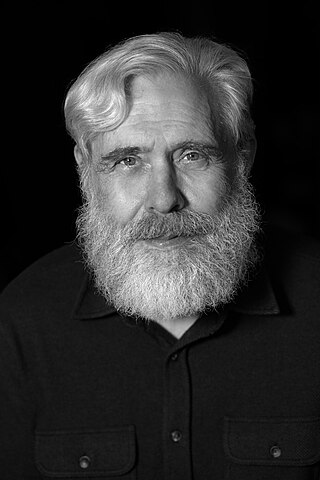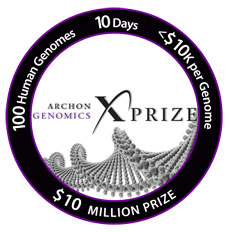In genetics, shotgun sequencing is a method used for sequencing random DNA strands. It is named by analogy with the rapidly expanding, quasi-random shot grouping of a shotgun.

Genomics is an interdisciplinary field of biology focusing on the structure, function, evolution, mapping, and editing of genomes. A genome is an organism's complete set of DNA, including all of its genes as well as its hierarchical, three-dimensional structural configuration. In contrast to genetics, which refers to the study of individual genes and their roles in inheritance, genomics aims at the collective characterization and quantification of all of an organism's genes, their interrelations and influence on the organism. Genes may direct the production of proteins with the assistance of enzymes and messenger molecules. In turn, proteins make up body structures such as organs and tissues as well as control chemical reactions and carry signals between cells. Genomics also involves the sequencing and analysis of genomes through uses of high throughput DNA sequencing and bioinformatics to assemble and analyze the function and structure of entire genomes. Advances in genomics have triggered a revolution in discovery-based research and systems biology to facilitate understanding of even the most complex biological systems such as the brain.

A DNA sequencer is a scientific instrument used to automate the DNA sequencing process. Given a sample of DNA, a DNA sequencer is used to determine the order of the four bases: G (guanine), C (cytosine), A (adenine) and T (thymine). This is then reported as a text string, called a read. Some DNA sequencers can be also considered optical instruments as they analyze light signals originating from fluorochromes attached to nucleotides.

BGI Group, formerly Beijing Genomics Institute, is a Chinese genomics company with headquarters in Yantian District, Shenzhen. The company was originally formed in 1999 as a genetics research center to participate in the Human Genome Project. It also sequences the genomes of other animals, plants and microorganisms.
deCODE genetics is a biopharmaceutical company based in Reykjavík, Iceland. The company was founded in 1996 by Kári Stefánsson with the aim of using population genetics studies to identify variations in the human genome associated with common diseases, and to apply these discoveries "to develop novel methods to identify, treat and prevent diseases."
The Personal Genome Project (PGP) is a long term, large cohort study which aims to sequence and publicize the complete genomes and medical records of 100,000 volunteers, in order to enable research into personal genomics and personalized medicine. It was initiated by Harvard University's George M. Church in 2005. As of November 2017, more than 10,000 volunteers had joined the project. Volunteers were accepted initially if they were permanent residents of the US and were able to submit tissue and/or genetic samples. Later the project was expanded to other countries.

George McDonald Church is an American geneticist, molecular engineer, chemist, serial entrepreneur, and pioneer in personal genomics and synthetic biology. He is the Robert Winthrop Professor of Genetics at Harvard Medical School, Professor of Health Sciences and Technology at Harvard University and Massachusetts Institute of Technology, and a founding member of the Wyss Institute for Biologically Inspired Engineering at Harvard. Through his Harvard lab Church has co-founded around 50 biotech companies pushing the boundaries of innovation in the world of life sciences and making his lab as a hotbed of biotech startup activity in Boston. In 2018, the Church lab at Harvard made a record by spinning off 16 biotech companies in one year. The Church lab works on research projects that are distributed in diverse areas of modern biology like developmental biology, neurobiology, info processing, medical genetics, genomics, gene therapy, diagnostics, chemistry & bioengineering, space biology & space genetics, and ecosystem. Research and technology developments at the Church lab have impacted or made direct contributions to nearly all "next-generation sequencing (NGS)" methods and companies. In 2017, Time magazine listed him in Time 100, the list of 100 most influential people in the world. In 2022, he was featured among the most influential people in biopharma by Fierce Pharma, and was listed among the top 8 famous geneticists of all time in human history. As of January 2023, Church serves as a member of the Bulletin of the Atomic Scientists' Board of Sponsors.

The Archon Genomics X PRIZE presented by Express Scripts for Genomics, the second X Prize offered by the X Prize Foundation, based in Playa Vista, California, was announced on October 4, 2006 stating that the prize of "$10 million will be awarded to the first team to rapidly, accurately and economically sequence 100 whole human genomes to an unprecedented level of accuracy." The 30 day evaluation phase of the competition to begin on September 5, 2013, was canceled August 22, 2013 and this cancellation was debated on March 27, 2014.
Illumina, Inc. is an American biotechnology company, headquartered in San Diego, California, and it serves more than 155 countries. Incorporated on April 1, 1998, Illumina develops, manufactures, and markets integrated systems for the analysis of genetic variation and biological function. The company provides a line of products and services that serves the sequencing, genotyping and gene expression, and proteomics markets.
Personal genomics or consumer genetics is the branch of genomics concerned with the sequencing, analysis and interpretation of the genome of an individual. The genotyping stage employs different techniques, including single-nucleotide polymorphism (SNP) analysis chips, or partial or full genome sequencing. Once the genotypes are known, the individual's variations can be compared with the published literature to determine likelihood of trait expression, ancestry inference and disease risk.

Whole genome sequencing (WGS), also known as full genome sequencing, complete genome sequencing, or entire genome sequencing, is the process of determining the entirety, or nearly the entirety, of the DNA sequence of an organism's genome at a single time. This entails sequencing all of an organism's chromosomal DNA as well as DNA contained in the mitochondria and, for plants, in the chloroplast.
Complete Genomics is a life sciences company that has developed and commercialized a DNA sequencing platform for human genome sequencing and analysis. This solution combines the company's proprietary human genome sequencing technology with its informatics and data management software to provide finished variant reports and assemblies at Complete Genomics’ commercial genome center in Mountain View, California.

Exome sequencing, also known as whole exome sequencing (WES), is a genomic technique for sequencing all of the protein-coding regions of genes in a genome. It consists of two steps: the first step is to select only the subset of DNA that encodes proteins. These regions are known as exons—humans have about 180,000 exons, constituting about 1% of the human genome, or approximately 30 million base pairs. The second step is to sequence the exonic DNA using any high-throughput DNA sequencing technology.
Knome, Inc. was a human genome interpretation company based in Cambridge, Massachusetts. Launched in 2007, Knome focused on improving quality of life by applying insights gained from the interpretation of human genomes. They helped identify and classify the variants, genes, and gene sets that are likely to govern or underlie a specific disease, tumor, or drug response. Their clients included academic, pharmaceutical and medical researchers. In 2015, it was acquired by Tute Genomics.

The $1,000 genome refers to an era of predictive and personalized medicine during which the cost of fully sequencing an individual's genome (WGS) is roughly one thousand USD. It is also the title of a book by British science writer and founding editor of Nature Genetics, Kevin Davies. By late 2015, the cost to generate a high-quality "draft" whole human genome sequence was just below $1,500.
Human Longevity, Inc. is a San Diego-based venture launched by Craig Venter and Peter Diamandis in 2013. Its goal is to build the world's most comprehensive database on human genotypes and phenotypes, and then subject it to machine learning so that it can help develop new ways to fight diseases associated with aging. The company received US$80 million in investments in its Series A offering in summer 2014 and announced a further $220 million Series B investment offering in April 2016. It has made deals with drug companies Celgene and AstraZeneca to collaborate in its research.
Genetic privacy involves the concept of personal privacy concerning the storing, repurposing, provision to third parties, and displaying of information pertaining to one's genetic information. This concept also encompasses privacy regarding the ability to identify specific individuals by their genetic sequence, and the potential to gain information on specific characteristics about that person via portions of their genetic information, such as their propensity for specific diseases or their immediate or distant ancestry.

Helmy Eltoukhy is an American scientist and a businessperson who co-founded startups Avantome and Guardant Health. He is best known for his contributions to genomics, semiconductor DNA sequencing, and personalized medicine. His startups were acquired by Illumina in 2008. Avantome was founded to develop and commercialize semiconductor-based DNA sequencing, during the race for the $1,000 genome. Guardant Health was founded to pioneer non-invasive liquid biopsy approaches for cancer diagnosis, monitoring, personalized medicine treatment, and research.
Nebula Genomics is a personal genomics company based in San Francisco, California. It offers a whole-genome sequencing service.
Personalized genomics is the human genetics-derived study of analyzing and interpreting individualized genetic information by genome sequencing to identify genetic variations compared to the library of known sequences. International genetics communities have spared no effort from the past and have gradually cooperated to prosecute research projects to determine DNA sequences of the human genome using DNA sequencing techniques. The methods that are the most commonly used are whole exome sequencing and whole genome sequencing. Both approaches are used to identify genetic variations. Genome sequencing became more cost-effective over time, and made it applicable in the medical field, allowing scientists to understand which genes are attributed to specific diseases.








